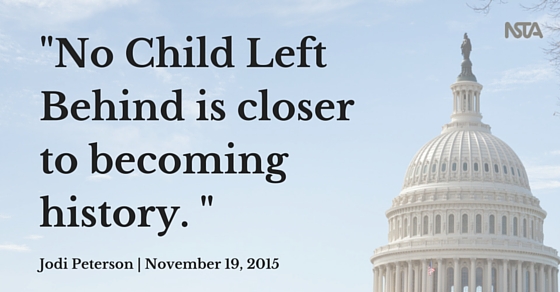NCLB Reauthorization Moves Forward; New Ed Law Possible by Christmas
By Jodi Peterson
Posted on 2015-11-19
No Child Left Behind is closer to becoming history.
Earlier this week House and Senate education leaders announced they had come to an agreement on the major differences between the House-passed (H.R. 5) and Senate-passed (S.1177) bills to reauthorize No Child Left Behind and quickly named conference committee members. A three-page summary of the Framework agreed to by the top four education leaders in Congress (Reps. John Kline, R-Minn.; Bobby Scott, D-Va.; and Sens. Lamar Alexander, R-Tenn.; and Patty Murray, D-Wash.) was released at the start of the conference and guided the discussion that started yesterday afternoon.
Earlier today (November 19), the conference committee voted 39 to 1 to approve the Framework (as amended). The text of the new bill is expected to be out on Monday, November 30. Chairman Kline indicated he hopes the bill will go to the House floor for a final up or down vote either on December 2 or 3.
What’s in the Framework for STEM?
Much more information will be available next week when actual language is available. But from the Framework document it appears that science tests will continue and must be given three times between grades 3 and 12. Annual, statewide assessments in reading and math in grades 3 through 8 and once in high school will continue.
Title II continues to provide substantial support for teacher professional development, induction programs, and recruitment. It eliminates the federal mandates for teacher evaluations. A change in funding formula will allow states with a higher number of low income students to receive funding.
The Math and Science Partnership program, along with a number of smaller, targeted programs, was streamlined into a massive Title IV block grant. Districts will be able to choose from a number of allowable uses, including implementation of key STEM activities.
Replacing the MSP program under Title II of the law is a provision reserving funding for the Secretary to award grants to State educational agencies to enable them to support the development of State wide STEM master teacher corps and to develop and implement state-wide STEM teacher professional development.
Other Issues in the Framework
- Accountability: Continues annual, statewide assessments in reading and math in grades 3 through 8 and once in high school. Science tests will continue and must be given three times between grades 3 and 12. Eliminates “adequate yearly progress” federal accountability system and allows states to develop their own system to identify and support struggling schools. States can measure school performance using multiple measures. They are required to improve student learning in the state’s lowest performing 5 percent of schools. The Framework maintains the annual reporting of data disaggregated by subgroups of children and establishes a state-level participation cap of 1 percent of students with the most significant cognitive disabilities who can take the alternate assessment.
- Standards: States are able to choose their standards in reading and math without interference from Washington. The federal government may not mandate or incentivize states to adopt or maintain any particular set of standards, including Common Core.
- Low Performing Schools: States are responsible for identifying and providing support for improvement in struggling schools. The federal government is prohibited from interfering in state and local decisions regarding accountability and school improvement activities.
- Grants to States and Districts. Authorizes a new Student Support and Academic Enrichment grant program that would allow states and school districts to determine how they will spend funding based on local needs and priorities.
- Authorizes Preschool Development Grants program and continues Charter Schools.
Read more in this Ed Week blog and in this press release on today’s conference meeting. Here is some information on how a bill becomes a law.
Jodi Peterson is Assistant Executive Director of Legislative Affairs for the National Science Teachers Association (NSTA) and Chair of the STEM Education Coalition. e-mail Jodi at jpeterson@nsta.org; follow her on Twitter at @stemedadvocate.
Disclaimer: The views expressed in this blog post are those of the author(s) and do not necessarily reflect the official position of the National Science Teaching Association (NSTA).


